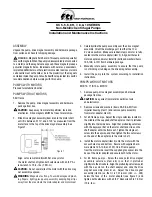
QS3
Power
Supply
Instruction
Manual
Technical Data
QS3.241
Output Voltage
DC 24-28V
externally adjustable
Factory Set
typ.
24.1V
at
full
rated
load
Output Current
min
3.4-3.0A
continuous
min
5.0-4.5A
for typ. 4 sec
Output Power
min.
80W
continuous
min.
120W
for typ. 4 sec
Output Ripple
max.
50mVpp
BW
DC
to
20MHz
Over-voltage Protection
max.
36Vdc
AC Input Voltage
-
AC 100-240V
-15/+15%
, 50-60Hz
TN, TT and IT mains
AC Input Current
max.
1.8-1.0A
at
100
-
240Vac
DC Input
-
DC 110-300V -20/+25%
DC Input Current
max.
0.85-0.3A
at
110
-
300Vdc
Power Factor
typ.
0.55-0.47
at 100 - 230Vac
AC Inrush Current
max. 6A peak, 2A
2
s
at 100Vac
max. 7A peak, 2A
2
s at
120Vac
max. 13A
peak,
2A
2
s at
230Vac
Efficiency
typ.
88.7 / 90.0%
at 120 / 230Vac
Losses
typ.
10.4 / 9.1W
at 120 / 230Vac
Hold-up Time
typ.
28ms
at
100Vac
typ.
41ms
at
120Vac
typ.
174ms
at
230Vac
Capacitive Loads
-
No limitations
Inductive Loads
-
No limitations
Limited Warranty
-
3 year
Environment
Protection
Operational temperature
-25 to +70°C
De-rate above +60°C
Output
Overload, no-load, short-circuit proof
Storage temperature
-40 to +85° C
Storage, transport
Degree of protection
IP 20
EN/IEC 60529
Humidity
5 to 95% RH
No condensation allowed
Class of protection
I
PE (Ground) connection required!
Vibration sinusoidal
2g IEC
60068-2-6
Degree of pollution
2
EN 50178, not conductive
Shock
30g 6ms, 20g 11ms
IEC 60068-2-27
Over-temperature protection
yes
Output shut-down with automatic restart
Output over-voltage protection
yes
Output shut-down with automatic restart
Over-voltage category
III EN
50178
Penetration protection
>3.5mm
e.g. screws, small parts …
Internal input fuse
T6.3A
Device protection, not externally
accessible
Allowed output current versus
the ambient temperature
Ambient temperature is defined
2cm below the unit.
0%
25%
50%
75%
100%
125%
150%
-40°C -20°C 0°C 20°C 40°C 60°C 80°C
Ambient Temperature
for ty p. 4s
continuous
External protection
The unit is tested and approved for branch circuits
up to 20A. External protection is only required, if the
supplying branch has an ampacity greater than this.
The minimum rating of an external circuit breaker or
fuse shall be 6A (B-characteristic) or 6A (C-
characteristic) to avoid a wrong tripping of the fuse.
Functional Diagram
Dielectric Strength
Type tests and factory tests:
Conducted by the manufacturer.
Do not repeat test in field!
Field test rules:
(1) Use appropriate test equipment which
apply the voltage with a slow ramp!
(2) Connect L and N together as well as all
output poles.
(3) Use only AC test-voltages with 50/60Hz.
The output voltage is floating and has no ohmic
reference to ground.
A
C
N
L
Input
Earth
Output
-
+
B
A B C
Type Test
60s
2500Vac 3000Vac 500Vac
Factory Test
5s 2500Vac 2500Vac 500Vac
+
+
-
-
V
OUT
Input Fuse
Input Filter
Input Rectifier
Inrush Limiter
Transient Filter
Output
Voltage
Regulator
Power
Converter
Output
Filter
Output
Voltage
Monitor
Output
Power
Manager
Temper-
ature
Shut-
down
Over-
load
DC
ok
Output
Over-
Voltage
Protection
L
N
Field Test
5s 2000Vac 2000Vac 500Vac
Overload Performance
The unit is designed to support loads with a higher short-
term power requirement without damage or shutdown.
Repetitive pulse loading:
Multiple pulses can be supported as long as the average
(R.M.S.) output current stays below the specified continuous
output current. If it is higher, the unit will respond with a
thermal shut-down.
Examples for pulse load
compatibility:
P
PEAK
P
0
T
PEAK
T
0
120W 80W 1s
>25s
120W 0W 1s
>1.3s
120W 40W 0.1s >0.16s
120W 40W 1s
>1.6s
0V
4V
8V
12V
16V
20V
24V
28V
0A
1A
2A
3A
4A
5A
6A
0s
1s
2s
3s
4s
5s
6s
7s
8s
9s
10s
110% 120% 130% 140% 150% 160%
120W 40W 3s
>4.9s
Output characteristic
(typ.)
Curve is valid for the 24V unit. Units with
output voltages other than 24V have an
equivalent and proportional performance.
Bonus time
Duration until the output starts dipping.
Bonus Time is hardware controlled.
min. / typ. / max.
t
100%
P
PEAK
0%
T
PEAK
P
0
T
0
P
OUT
max.
150%
t
continuous
Short
term
min.
max.






















